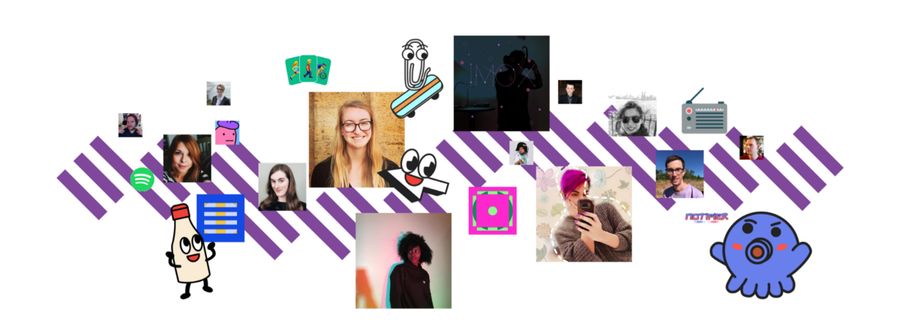To the Creekosystem and Beyond
Tech’s history is full of startup founders who all shared a common connection or history, from the “Traitorous Eight” at Fairchild Semiconductor and the resulting “Fairchildren” companies like Intel and AMD, to the more recent PayPal mafia, which spawned Palantir, LinkedIn, Tesla, and various VC firms, among others. But one of the most successful tech founder networks of all time often gets overlooked.
The network of companies built by Fog Creek employees, alumni and the descendants of those efforts is extraordinary. Fog Creek’s founders and alumni have co-founded or led many of the most beloved and important tech companies of the last decade. If we were a little bit more cheesy, we might call it the “Creekosystem”.

First, there was Fog Creek. Founded by Joel Spolsky and Michael Pryor in 2000, it began as a consulting company working out of Joel’s grandmother’s brownstone apartment in New York. But while the origins may have been humble, their ambition was far from it: Joel and Michael set out to create the best place for developers to work.
Although it’s hard to imagine now, back then, software developers weren’t treated very well. Joel and Michael couldn’t find a place to work where programmers had decent working conditions and got an opportunity to do great work, so they decided to create their own.
They began with the physical environment, creating an office that was custom-designed by a top architect to be the ideal programming workspace. With private offices, windows everywhere, really comfortable chairs and all the large screen monitors you could want. But their people-friendly thinking didn’t stop there — it went into every decision they made. So Fog Creek set out to remove all the barriers that can get in the way of people from doing their best work. There was no getting sign-off to buy the tools you needed, and technical decisions were made by people with technical expertise, instead of having mandates handed down from above.
And it worked. Fog Creek successfully navigated the dot-com crash, bootstrapping the company into a growing business lead by its pioneering bug tracking product, FogBugz. Over the coming years, more products followed and lots of them were hugely successful. Fog Creek’s focus on treating developers well meant our company has always been able to attract talented individuals who were given autonomy to try out ideas and see where they went.

Noah Weiss, a young programmer who spent the summer of 2006 at Fog Creek, was one of those people with an idea. He proposed to Joel that a developer job listing business might be worth creating. The job listings were a runaway success, and the idea would later inform a big part of the business model behind Stack Overflow, which Joel teamed up with Jeff Atwood to create. It’s now the largest online community for programmers to learn, share their knowledge, and advance their careers.
The next huge break out from Fog Creek was Trello. It began during a “Creek Week” — the internal hackathons where new ideas at Fog Creek get invented. Trello was an instant hit and went on to be used by millions of people around the world to organize everything from their work to their wedding.
Fog Creek, Stack Overflow, and Trello operated as a family of companies, connected not just by their co-founders, but by their shared DNA of people-first principles. As people moved on, they embedded these principles wherever they went. Many staff from Fog Creek went on to roles at Trello and Stack Overflow, while others worked for companies like Google, Facebook, Twitter, Microsoft, Twilio, Slack, Heroku, GitHub, Dropbox, and Amazon. But working at Fog Creek didn’t just help them upgrade their careers — through their contributions they’ve upgraded the whole tech industry, too.
Take Ben Kamens, for example. He became the founding engineer at Khan Academy, a non-profit educational organization who create online tools that have helped educate millions of students around the world. He’s now founder and CEO of Spring Discovery, a health-tech company who use machine learning to develop therapies that reduce disease.
Fellow alumni, Andrew Song, co-founded Whisper.ai who use deep learning in hearing aids, after roles at Facebook and Google. William Zimrin is co-founder and CTO at OrganizeTogether, who create tools for grassroots organizing. The super-handy secure tunnel software, ngrok, was created by another Fog Creek alumni, Alan Shreve. And Emmett Nicholas is cofounder and CTO at Airtable, who launched the popular, VC-backed collaboration tool company after working for many years at Stack Overflow.
But former Creekers haven’t just created their own businesses, they’ve helped grow major companies too. Like Noah Weiss, the ‘job listings guy’ we mentioned earlier. He leads the Search, Learning & Intelligence group at Slack, having forged a fantastic career via roles at Google and Foursquare. And there’s Liz Hall, one of the earliest Fog Creek employees who almost single-handedly ran recruiting at Trello, and is now having the same impact as VP People Ops for the innovative real estate platform, Cadre.
This network of companies and people have been hugely successful. But what really joins them are just a few simple, shared principles and practices:
The most important tenet that began it all back in 2000 is still as important as ever today. By putting people first, they’re free to do their best work and it’s a big part of why Fog Creek’s impact on the world rivals companies a thousand times its size.
Fog Creek alumni haven’t created growth-at-all-costs, get-rich-quick businesses. Instead, they’ve applied the bootstrapped sensibilities learned at Fog Creek and have established business models that thrive only when they’re creating real value for their customers.
This is more than just selling shovels in a gold rush, it’s a desire to really make a difference. Whether that’s helping people work together with products like Airtable, ngrok and Trello, or by preserving their health and advancing their personal development at Whisper, Spring Discovery, and Khan Academy.
Few sites have been a force multiplier for developers quite like Stack Overflow. But with Glitch, we aim to have an even greater positive impact. We’re innovating on what to date has just been seen as “developer tools”, turning them into a set of creative and expressive tools that enable people of any skill level to be able to create online. And as a platform, Glitch is reminding folks that the web is still a fun, creative place that any of us can build. It’s already inspired people to create over a million apps — from cutting-edge VR apps to distributed apps, bots, and more.
Perhaps what’s most exciting is that now Fog Creek employees and alumni are joined by the creative coders, designers, artists, activists, and educators from all over the world who comprise the friendly, creative Glitch community. And together, the impact we can all have on the web is far greater than anything we’ve seen as a company so far.

